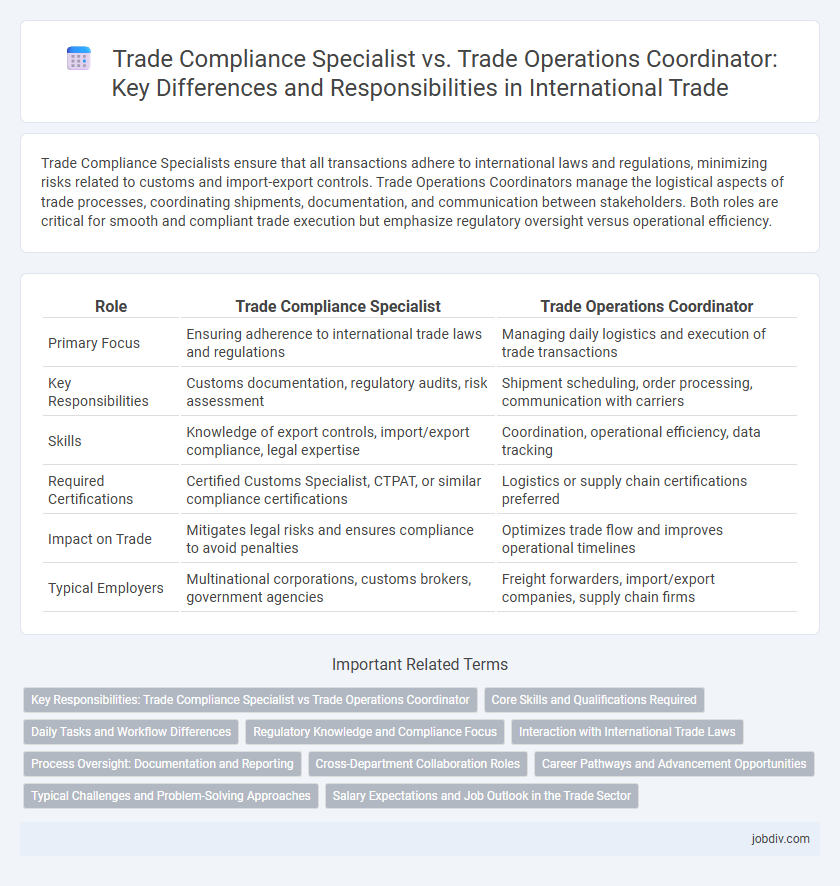Trade Compliance Specialists ensure that all transactions adhere to international laws and regulations, minimizing risks related to customs and import-export controls. Trade Operations Coordinators manage the logistical aspects of trade processes, coordinating shipments, documentation, and communication between stakeholders. Both roles are critical for smooth and compliant trade execution but emphasize regulatory oversight versus operational efficiency.
Table of Comparison
| Role | Trade Compliance Specialist | Trade Operations Coordinator |
|---|---|---|
| Primary Focus | Ensuring adherence to international trade laws and regulations | Managing daily logistics and execution of trade transactions |
| Key Responsibilities | Customs documentation, regulatory audits, risk assessment | Shipment scheduling, order processing, communication with carriers |
| Skills | Knowledge of export controls, import/export compliance, legal expertise | Coordination, operational efficiency, data tracking |
| Required Certifications | Certified Customs Specialist, CTPAT, or similar compliance certifications | Logistics or supply chain certifications preferred |
| Impact on Trade | Mitigates legal risks and ensures compliance to avoid penalties | Optimizes trade flow and improves operational timelines |
| Typical Employers | Multinational corporations, customs brokers, government agencies | Freight forwarders, import/export companies, supply chain firms |
Key Responsibilities: Trade Compliance Specialist vs Trade Operations Coordinator
Trade Compliance Specialists focus on ensuring adherence to international trade laws, managing export and import regulations, and conducting risk assessments to prevent legal violations. Trade Operations Coordinators oversee the daily logistics of trade activities, coordinate shipment processes, handle documentation, and facilitate communication between suppliers and regulatory agencies. Both roles are critical in maintaining smooth and compliant trade flows but differ in their emphasis on regulatory compliance versus operational execution.
Core Skills and Qualifications Required
A Trade Compliance Specialist requires in-depth knowledge of international trade regulations, customs laws, and risk management techniques, alongside strong analytical skills to ensure adherence to legal standards. In contrast, a Trade Operations Coordinator needs proficiency in logistics coordination, shipment tracking, and documentation management, emphasizing organizational skills and operational efficiency. Both roles demand a solid understanding of trade policies, but the specialist leans towards compliance oversight, while the coordinator focuses on execution and process facilitation.
Daily Tasks and Workflow Differences
Trade Compliance Specialists focus on ensuring adherence to international trade regulations, conducting audits, and managing documentation to prevent legal risks. Trade Operations Coordinators handle the execution of shipments, coordinate with logistics providers, and monitor supply chain timelines to maintain smooth operational flows. The Compliance Specialist's workflow centers around regulatory verification and risk mitigation, while the Operations Coordinator emphasizes process efficiency and shipment tracking.
Regulatory Knowledge and Compliance Focus
Trade Compliance Specialists possess in-depth expertise in international trade regulations, customs laws, and import/export controls to ensure adherence to legal standards and minimize risks of violations. Trade Operations Coordinators focus on the execution and coordination of trade activities, relying on procedural knowledge rather than specialized regulatory expertise. Regulatory knowledge is the core competency of Trade Compliance Specialists, making them critical for maintaining compliance frameworks, while Trade Operations Coordinators support operational efficiency without direct responsibility for compliance enforcement.
Interaction with International Trade Laws
A Trade Compliance Specialist ensures strict adherence to international trade laws by managing regulatory documentation, conducting compliance audits, and staying updated on global trade regulations to prevent violations and penalties. A Trade Operations Coordinator focuses on the execution of trade transactions, coordinating logistics, and facilitating communication between suppliers, carriers, and customs officials while supporting compliance efforts. Both roles require detailed knowledge of international trade laws, but the Compliance Specialist emphasizes regulatory enforcement, whereas the Operations Coordinator prioritizes operational efficiency within legal frameworks.
Process Oversight: Documentation and Reporting
Trade Compliance Specialists ensure accurate documentation and adherence to international trade regulations, minimizing risks of customs delays and penalties. Trade Operations Coordinators manage the flow of trade documentation, verifying shipment details and coordinating with logistics to maintain seamless trade execution. Both roles emphasize meticulous reporting and oversight to uphold compliance and operational efficiency in global trade processes.
Cross-Department Collaboration Roles
Trade Compliance Specialists ensure that all international transactions comply with global trade regulations, working closely with legal and customs departments to mitigate risk. Trade Operations Coordinators facilitate the execution of trade processes by coordinating between logistics, finance, and customer service teams to maintain smooth operations. Both roles require strong cross-department collaboration to align compliance standards with operational workflow and strategic business goals.
Career Pathways and Advancement Opportunities
Trade Compliance Specialists typically advance by gaining expertise in regulatory frameworks such as ITAR, EAR, and Customs regulations, leading to roles like Compliance Manager or International Trade Consultant. Trade Operations Coordinators often progress through mastering supply chain logistics and documentation processes, opening pathways to positions like Operations Manager or Supply Chain Analyst. Both career trajectories benefit from certifications such as Certified Export Specialist (CES) or Certified Supply Chain Professional (CSCP) to enhance advancement opportunities.
Typical Challenges and Problem-Solving Approaches
Trade Compliance Specialists face challenges such as navigating complex regulatory frameworks and ensuring adherence to international trade laws, requiring in-depth knowledge of customs regulations and risk assessment methodologies. Trade Operations Coordinators encounter difficulties in managing logistics, coordinating shipments, and resolving operational delays, relying on process optimization and effective communication with stakeholders. Both roles necessitate proactive problem-solving skills, with Compliance Specialists emphasizing regulatory audit readiness and Coordinators focusing on streamlining workflow efficiency.
Salary Expectations and Job Outlook in the Trade Sector
Trade Compliance Specialists typically earn an average salary of $65,000 to $85,000 annually, reflecting their expertise in regulatory adherence and risk management within international trade. Trade Operations Coordinators have a slightly lower average salary range of $50,000 to $70,000, focusing on logistical support and process coordination in trade activities. The job outlook for Trade Compliance Specialists is strong due to increasing trade regulations, while Trade Operations Coordinators also benefit from steady demand driven by global supply chain growth.
Trade Compliance Specialist vs Trade Operations Coordinator Infographic

 jobdiv.com
jobdiv.com